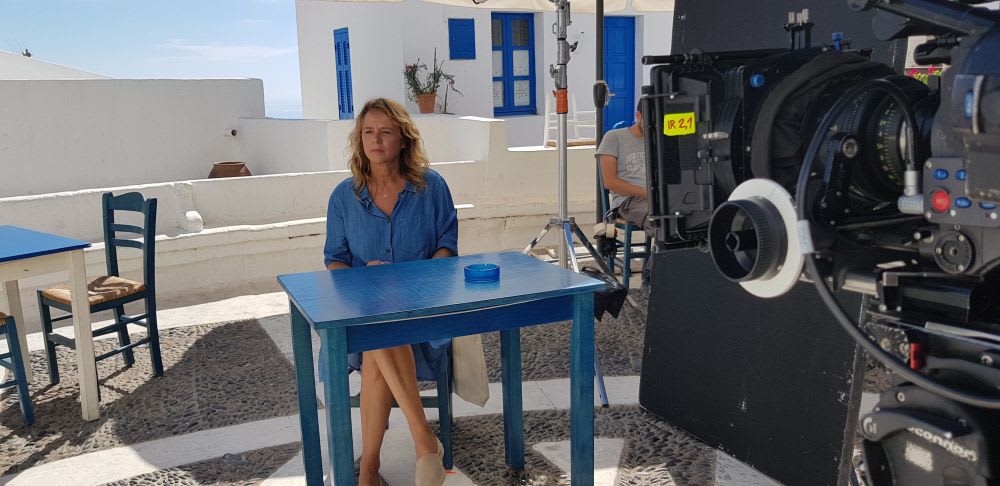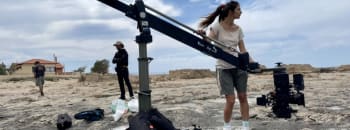Exclusive KFTV Report: Top 10 things to know about filming in Greece
KFTV interviews Stavroula Geronimaki, acting director of Hellenic Film Commission, about why international productions are flocking to the country
By Chris Evans 23 May 2022

Exclusive Report: Top 10 things to know about filming in Greece
Several big projects from the likes of Netflix, Disney+ and Paramount and award-winning directors are choosing to shoot in Greece, including Cannes competition titles, Crimes of the Future, directed by David Cronenberg, and Ruben Ostlund’s Triangle of Sadness.
In the last couple of years, Greece has hosted approximately 200 projects of various sizes, including Netflix’s follow-up film to the murder mystery Knives Out, starring Daniel Craig; Amazon and Paramount’s Tom Clancy’s Jack Ryan season three; Crimes of the Future; Disney+ move Rise, also known as Greek Freak, about the life of Milwauke Bucks basketball player Giannis Antetokounmpo, and Millennium Media’s The Bricklayer, starring Aaron Eckhart.
Nia Vardalos’s My Big Greek Wedding 3 is also set to shoot in Greece this summer, as confirmed by KFTV at Cannes.
Here we talk to Stavroula Geronimaki, acting director of the Hellenic Film Commission (HFC), about what is drawing these projects in and the top 10 things international producers and location managers need to know about shooting in the country.
1/ Stunning locations
From archaeological sites and islands to jungles, volcanos and snow-capped mountains, Greece offers every type of location, which can double for anywhere in the world.
“Everybody knows Greece has fantastic locations, and it’s not only the incredible islands, but also over the mainland with a huge variety of archaeological and historical sites that span different Millenia, from the Acropolis to medieval towns and Venetian ports,” enthuses Geronimaki.
There’s no doubting the appeal of the islands, though. Ruben Östlund shot his dark comedy Triangle of Sadness, that premiers In Competition in Cannes 2022 starring Woody Harrelson, on the island of Evia, which combines mountains, forests and rivers with great beaches offering stunning jungle like backdrops.
Another Cannes competition title, the Canadian-Greek body-horror Crimes Of The Future filmed in Athens and the area of Attica during the summer of 2021. Director David Cronenberg was very impressed…
“We began exploring the opportunity to shoot in Greece. Looking at the unique buildings and exteriors in and around Athens, the incredible textures of an ancient city, the hypnotic presence of an ancient sea, my vision for the film suddenly coalesced. I fully embraced the gifts that Athens was presenting to me, and now it seems the film could not have come together anywhere else.”
While the island of Spetses, with its Venetian mansions, played host to Maggy Gyllenhaal’s directorial debut, The Lost Daughter, starring Olivia Colman and Dakota Johnson. “They were really happy to be safe in a protected, Covid free island,” enthuses Geronimaki. The island also hosted the follow-up film to Knives Out in summer 2021.
The mainland of Greece and the region of Epirus hosted the Netflix TV series Beckett, directed by Ferdinando Cito Filomarino. Filming took place across the Vikos–Aoos Geopark with its spectacular views of mountains, forests and rivers and fertile plains and valleys in the mountain ranges from north to south.
The beautiful Ionian island of Corfu has also been used for the ITV series The Durrells with its Italian and Venetian architecture and flavour.
“You can even film within the crater of a volcano on the other worldly island of Nisyros, as Miguel Angel Jimenez did for his Spanish-Greek co-production, Window to the Sea,” adds Geronimaki.

Window to the Sea filming in Greece.
Greece is also great as a double for other places. The Israeli TV series Tehran, for example, managed to shoot Athens for Iran. “While the BBC’s Little Drummer Girl series used Elefsina to represent Lebanon and doubled Nikaia in Athens for Palestine,” says Geronimaki.

The Little Drummer Girl filming in Greece.
2/ Light and Climate
There are 250 days of bright sunshine each year in Greece. “We have the best climate in Europe and long hours of daylight for shooting, which is something that film crews and DoPs really appreciate,” says Geronimaki.
3/ Incentives
Aside from the striking locations, another key drawcard for international productions is the country’s impressive combination of a cash rebate worth up to 40% and a 30% tax relief.
“Greece has been in the spotlight because of these incentives, operated and handled by EKOME (National Centre of Audiovisual Media and Communication), which a lot of productions have already benefited from,” says Geronimaki. “The minimum expenditure for the cash rebate is very low - only €100,000 for feature films.”
Applications for the cash rebate are allowed all year round and just need to be done at least 10 days before shooting begins. International productions need to pass a cultural test and apply through a local production outfit.
More information can be found on the EKOME and Hellenic Film Commission websites.
4/ Hellenic Film Commission services
Before, during and after your time filming in Greece the Hellenic Film Commission is committed to provide you with top-notch support and guidance regarding funding opportunities, locations, the local production industry and filming permits.
“With my decades of experience at the Greek Film Centre in various positions I have gained a deep understanding of the local filming landscape and I feel confident that along with the HFC team we can help you realise your filming project to the best of its potential,” states Geronimaki.
5/ Further economic/financial support
The Hellenic Film Commission also offers a new Location Scouting Support Program available to international film and TV projects conducting preliminary scouting in the country. They will need to shoot for at least 15 days (7 days for docs) and spend at least €50,000 in Greece. The maximum subsidy is €10,000, which has to be accessed through a Greek company.
The program runs for a year and until now we have handled and supported 10 projects that have already completed shooting in Greece or about to shoot.
“We want to attract productions as early as possible and guide them through the landscape and filming environment in Greece,” says Geronimaki.
The Greek Film Center also offers several funding programs for the support and development of film including international projects.
6/ Co-production treaties
The Greek Film Centre (GFC) is the official representative of Greece at Eurimages “with many successful co-productions through that,” says Geronimaki.
Greece has also signed the European convention for co-productions. Film co-production agreements have being signed with Canada, Israel and the Republic of China. “So, productions and producers from those countries benefit from these, including David Cronenberg’s new project,” says Geronimaki.
7/ Film office support
The Hellenic Film Commission should be the first port of call for international productions. Not only do they explain about the incentives and the location scouting program, they can also provide productions who have scheduled to shoot in Greece with a letter to facilitate filming, which has proved useful for them when applying to local authorities for filming permits.
Once projects are in the country, the HFC can also liaise between the production figures and local authorities, and provide networking with local crew, such as location managers.
Aside from the Hellenic Film Commission of the Greek Film Centre, there’s also the Athens Film Office, which has assisted several productions, as well as regional offices in Central Macedonia, Epirus, Ionian Islands, Crete and Western Greece.
“There are many others coming up because EKOME and ourselves are working with other regions to help them set up film offices and attract productions, guiding them through their own territory and location authorities,” says Geronimaki.
8/ Handling Covid and protocols
“One of the reasons we’ve had such great traffic of productions coming into Greece is because we’ve handled the pandemic well and have thorough protocols in place issued by the ministry of culture,” insists Geronimaki.
When Greece entered the second state of lockdown in November, there were a few productions still shooting in the country, including Östlund’s Triangle of Sadness. “That only had five days left of shooting, so we managed to persuade government officials that is was important for filming to continue with extra protocols and measures,” adds Geronimaki.
9/ Quality crew
“Greece has experienced high-quality crew who speak English. The majority of crew are based in Athens but can work all over the country,” states Geronimaki.
The increase in the number of international productions shooting in the country and using local crew over the past few years has undoubtedly helped.
Additionally, our producers have been internationally recognised and have received prestigious awards for their work on international productions.
10/ Quality of life
We have quality weather, food, hotels everything. Everyone has a huge smile on their faces when they film here. “Ruben Östlund said filming in Greece reminded him of why he loves his profession,” says Geronimaki.
Latest news & features
Featured profiles
Promote your services with KFTV
Choose from three profile types - Basic, Silver and Gold
Create ProfileWe offer a range of display advertising opportunities.
Learn More



